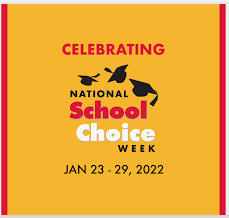
Students at Betsy Ross Arts Interdistrict Magnet School in New Haven, Connecticut, study dance, theater and visual arts with professional artists as well as certified teachers.
Editor’s note: This commentary from Danielle Gregory-Williams, a magnet recruitment specialist in New Haven, Connecticut, makes the point that education choice is alive and well in public schools, too, rounding out our coverage of National School Choice Week. It appeared this week on the New Haven Register.
 National conversations about school choice often fixate on private schools or vouchers, but, in New Haven, public school choice is a critical component of efforts to expand opportunity for every child. Having choices makes public education more diverse — and that’s a great thing.
National conversations about school choice often fixate on private schools or vouchers, but, in New Haven, public school choice is a critical component of efforts to expand opportunity for every child. Having choices makes public education more diverse — and that’s a great thing.
As an umbrella term, school choice means giving families the opportunity to select from an array of learning options, so they can choose the one that best fits their child’s academic needs. Just as no two children are the same, no two public schools are the same either.
In New Haven, school choices include an incredible diversity of public options, including citywide and interdistrict magnet schools with intentional specializations, neighborhood schools rooted in local communities, and public charter schools.
Diverse school offerings honor students’ differences, ensuring that curricular programs meet kids’ specific needs and create multiple pathways to academic and career success. In particular, citywide and interdistrict magnet schools serve to reduce racial and economic isolation, bringing together students from many New Haven neighborhoods.
Just consider a few examples of what New Haven offers: At Barack H. Obama Magnet University, students focus on a STEM-curriculum and effective communication, receiving language instruction in Chinese and American Sign Language. At Betsy Ross Arts Interdistrict Magnet School, students study dance, theater and visual arts with professional artists as well as certified teachers.
To continue reading, click here.

Because the amount of an educations savings account can be far less than a school district’s per-pupil cost, ESAs have the potential to be a financial plus for states like Connecticut, where the public school per-pupil cost for Hartford students is almost seven times that of a typical K-8 parochial school tuition in the same area, such as the Watkinson School.
Editor’s note: This commentary from Lewis M. Andrews, chair of the Children’s Educational Opportunity Foundation of Connecticut, appeared Saturday on the New Haven Register.
A recently released school reform study in New York promises timely fiscal as well as educational benefits, and not just for the Empire State. Some quick background helps us appreciate the study’s important implications for Connecticut.
In 2011, Arizona became the first state to adopt what is called an education savings account, or ESA, policy. ESA plans provide parents who believe their child is not adequately served by the local public school with an annual budget which can be spent on a variety of accredited options — not just traditional private or parochial schools, but tutoring, online academies, special needs services, micro schools and so on.
In the years since, Florida, Indiana, Kentucky, Mississippi, Missouri, Nevada, New Hampshire, North Carolina, Tennessee, and West Virginia have all followed Arizona’s lead with similar programs.
A legal challenge from the local teacher union has kept the Nevada plan in litigation limbo, but grateful parents in the other states have been using ESAs to school their children at home or in small groups during the COVID-19 pandemic.
ESAs were originally designed as an instructional reform, to give K-12 children more learning options. But because the amount of an education savings account can be far less than a school district’s per-pupil cost, ESAs have always had the potential to be a financial plus, as well.
Consider, for example, the situation in Hartford, where the public school per-pupil cost is almost seven times that of a typical K-8 parochial school tuition in the same area. The intriguing question in a fiscally troubled state like Connecticut is how much a statewide ESA policy might save all taxpayers.
To continue reading, click here.
Indiana: Lawmakers expand state's school voucher program to allow more children to be immediately eligible. (Associated Press). The legislature may forgive $12 million in loans to nine failing charter schools (Associated Press).
Washington, D.C. : Charter advocates make their annual plea to district officials for equitable funding (Washington Post). Malcolm E. "Mike'' Peabody saw improving the city's schools as a civil rights issue, which led him to found a powerful pro-charter advocacy group in 1996 called FOCUS -Friends of Choice in Urban Schools (Washington Post).
 Florida: Florida Virtual School is already taking a hit with enrollment as lawmakers debate bill that ultimately cuts funding to the program (redefinED). More from the Orlando Business Journal and the Associated Press. Gov. Rick Scott signs the Career and Professional Education Act, what some lawmakers call the most "transformational" education bill of the 2013 legislative session (Tallahassee Democrat). The parent trigger bill moves to the Senate floor, but likely will see more drama with last-minute changes (redefinED). And the parent trigger debate continues to churn controversy, with a video said to be from a mysterious grass-roots group that turns out to be Parent Revolution (Miami Herald).
Florida: Florida Virtual School is already taking a hit with enrollment as lawmakers debate bill that ultimately cuts funding to the program (redefinED). More from the Orlando Business Journal and the Associated Press. Gov. Rick Scott signs the Career and Professional Education Act, what some lawmakers call the most "transformational" education bill of the 2013 legislative session (Tallahassee Democrat). The parent trigger bill moves to the Senate floor, but likely will see more drama with last-minute changes (redefinED). And the parent trigger debate continues to churn controversy, with a video said to be from a mysterious grass-roots group that turns out to be Parent Revolution (Miami Herald).
Pennsylvania: The Philadelphia school district plans to open a virtual academy to lure back students and families (Education Week). If 21 charter schools get their wish - to add 15,000 new charter students in the next five years - the Philadelphia school district could be faced with losing millions in funding (NewsWorks). And now the district says it can't expand charters due to a $300 million budget shortfall (CBS Philly). Mother of a son with autism plans to open the Pennsylvania Autism Charter School with a goal to eventually return students to regular classroom (Express-Times).
Illinois: Parents of charter school students have formed a new group, Charter Parents United, to advocate for more equality - especially concerning public school funding (Chicago Tribune). Gov. Pat Quinn has cut off state funding to the United Neighborhood Organization, the state's largest charter school operator, due to allegations of corruption (CBS Chicago). (more…)